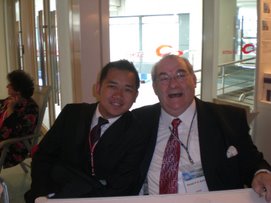 Often when we get in touch with our most heartfelt and hopeful dreams what may also surface are some of our doubts. There is an important relationship between the Dreamer and the Doubter that live inside of us. It is useful and necessary to develop skills for dealing with our doubt; otherwise your dreams could very well get squelched.
Often when we get in touch with our most heartfelt and hopeful dreams what may also surface are some of our doubts. There is an important relationship between the Dreamer and the Doubter that live inside of us. It is useful and necessary to develop skills for dealing with our doubt; otherwise your dreams could very well get squelched.The Dreamer inside of us encourages us with thoughts and comments like, “Yes you can. Go for it. You have what it takes.” By contrast, the internal Doubter voice may challenge and confront with comments such as, “What are you thinking? You’re too old (or too young), you don’t know what you are doing, and you don’t have the money or experience.”
If we turn the voice of the Doubter down it becomes the voice of the Realist, the part of us that wants to know what we intend to do. Most often, the Realist wants to know where you will find the time and money, it wants to know your plan, but be careful. Early on, you may not have all the details figured out so if you go to strategic planning too soon, your need to be realistic may have you compromise on your idea before you fully explore what else is possible.
Consider this. If all parts of us carry wisdom, perhaps even the Doubter can provide insight. If you interviewed this part of yourself, literally asked about its concerns and issues around your dreams, you might get some useful information. For example, my own Doubter often offers thought-provoking questions and prudence.
Your Doubter could inform you of potential obstacles related to your dreams. Obstacles come primarily in two forms. They are either limiting beliefs, something that requires internal reflection or that you hold to be true. Alternatively, obstacles can also be something more external that require a plan, such as borrowing money or taking a class.
For example, if your dream is to write a book but you don’t know how, you might seek assistance or learn how to do it yourself. But if what you are feeling is fear of failure that is usually more of a limiting belief, something going on inside of you that only you can change or affect. Of course, once you identify what you’re afraid of a strategy like working with a coach or a daily practice of writing might get you over it. Some obstacles can be both belief and strategy.
Wherever there is an obstacle, you can manage it. But if you don’t know there are obstacles present you may get blind-sided or sabotage your dream. It is incredibly beneficial to hear from your Doubter. Be interested in what it has to say. Pull out a journal or pad of paper and explore what your real, imagined or potential obstacles may be. Knowledge is a powerful thing.
Most people either ignore or get consumed by their doubt.
I assure you, once you become aware that there is a Doubter inside of you that is not the enemy, you are much less likely to be stopped by it. Confusion and procrastination are often signs that the Doubter is present but not being acknowledged. How do you feel when you are trying to express and not being heard? I suggest you watch for signs and stop and listen.
Once you are able to learn from your doubt, other people’s doubts will have less impact on you. How might your life change if other people‘s negative comments only deepened your conviction to your dream? Once you deal with your own doubt you will no longer put the beliefs of others over your own. This is a sign of transformation as you become more inner-referenced. This can lead to deeper self-trust, which in turn will enable you to take greater risks and dream bigger dreams!











No comments:
Post a Comment